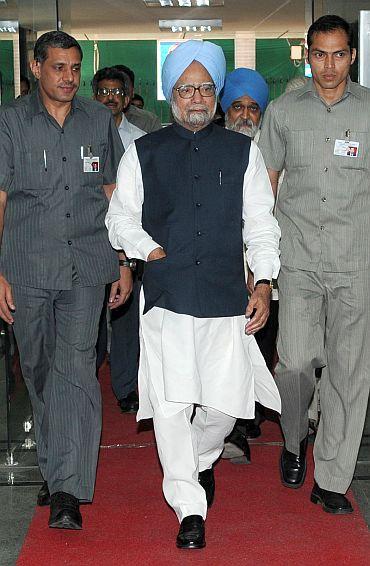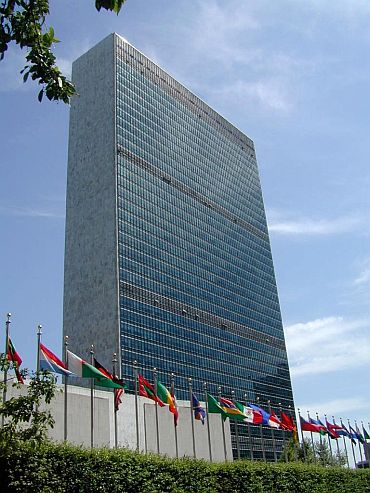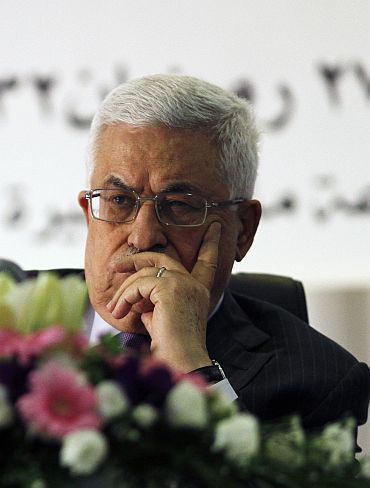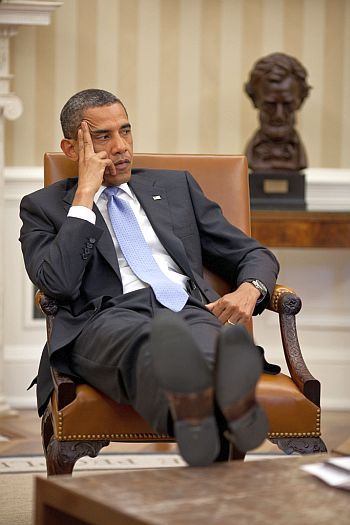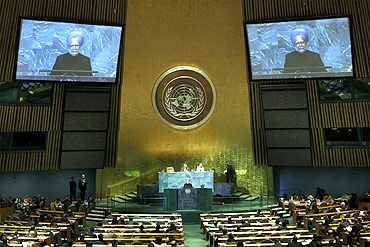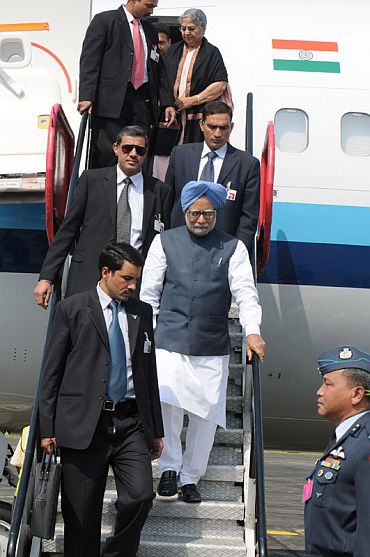 | « Back to article | Print this article |
PM steps on to the shifting sands at the UN
Prime Minister Dr Manmohan Singh may not have any initiative to announce at the UN General Assembly later this week, but his view of the world will be of some significance at this time of "unbridled consequences", says diplomat TP Sreenivasan
The belated decision of Prime Minister Manmohan Singh to attend the UN General Assembly after a break is wise, though a more timely decision would have made the visit more fruitful.
More than anything else, the trip will ease the impression both at home and abroad that he is bogged down in corruption scandals and is in no position to interact with the world, not to speak of taking international initiatives.
The argument that prevailed in the decision must have been that as a non-permanent member of the Security Council, India is in the limelight and the positions our permanent representative has taken in the Security Council need to be backed by the political leadership.
The prime minister may not have any initiative to announce in his speech, but his view of the world will be of some significance at this time of "unbridled consequences". India cannot but be seen to be capable and willing to play a role in the unfolding drama on the world stage.
A mistake that can be made, however, is to give the impression that the prime minister is on a hunt for what has come to be known as the "Holy Grail" of Indian foreign policy, namely, a permanent seat on the UN Security Council. Foreign Secretary Ranjan Mathai rightly emphasised other issues of importance to India, such as finding solutions for global economic and financial problems, counter-terrorism, peacekeeping operations etc, together with securing a robust and all inclusive role for all members of the UN.
He, of course, mentioned the G-4 initiative and our decision to pursue reforms.
T P Sreenivasan is a former ambassador of India to the United Nations, Vienna, and a former governor for India at the International Atomic Energy Agency, Vienna.
He is currently the Director General, Kerala International Centre, Thiruvananthapuram, and a Member of the National Security Advisory Board.
For more articles by Ambassador Sreenivasan, please click here
Click on NEXT to read further...
PM steps on to the shifting sands at the UN
The buzz that a decision on the Security Council expansion is close at hand is misleading.
Our goal of being a permanent member with the same rights and privileges as the other permanent members cannot be achieved under the laid down procedure for amendment to the UN Charter.
It will be too revolutionary a change for the permanent members and others to accept at this time.
The best that can be accomplished is the creation of a new category of members, who may serve longer terms on the Council. Such an expansion will not be in the spirit of the argument that the Security Council should reflect the realities of the present.
The latest proposal for an "interim solution", which seems to gain momentum in Europe, is even more dubious, because the idea of longer terms for some non-permanent members, if adopted as an "interim solution", may close the door for a comprehensive expansion.
India's claim has been established and generally accepted and we should express confidence rather than appear anxious to accept a "quick fix".
PM steps on to the shifting sands at the UN
Qatar, which has assumed an international profile beyond its size because of its wealth and imaginative initiatives, happens to be the president of the 66th UN General Assembly.
Coincidentally, the present session of the General Assembly is preoccupied with Arab issues, with the perennial Palestine issue demanding immediate attention on account of the declared intention of Palestine to seek full membership of the UN.
Palestine's options range from going to the Security Council and getting a veto from the United States to seeking an enhanced observer status through a majority vote in the General Assembly.
Whichever option that Mahmoud Abbas chooses, the most he can achieve is to convince Israel and the US that they have to face the issue of statehood sooner rather than later.
Frantic efforts are on to avoid a showdown, and thus Palestine has already succeeded in emphasising that the US and Israel should engage in more equitable negotiations.
But Palestine faces accusations of unilateralism and efforts to illegitimise Israel. At the same time, as Ambassador Gharekhan has pointed out, Israel and the US have a stake in the continuation of Abbas as the leader of Palestine.
"Neither Israel nor the US will find anyone as reasonable as Abbas, who may feel obliged to take some drastic step in case his initiative fails, such as resigning his post, thereby leaving the field to extremist elements among his people," he observes.
PM steps on to the shifting sands at the UN
India has no dilemma on Palestine as we recognise Palestine as a State and we can vote for any Palestine move even though our relations with Israel has become crucial.
Israel has shown understanding of the Indian compulsions in supporting Palestine and any effort on our side to moderate Palestine will not be of benefit to us. As a consistent supporter of Palestine, we have no role to play as an intermediary.
We have to tread cautiously on the "Arab Spring" issues, particularly on Libya and Syria. We have already made amendments for our abstention on Libya in the Security Council by joining the Friends of Libya group and by recognising the National Transitional Council.
On Syria, we have moderated the condemnation of human rights violations and moves for drastic sanctions so far. But these efforts by the West will gain momentum during the session with more countries expressing opinions on Syria, though the action will remain in the Security Council.
PM steps on to the shifting sands at the UN
A more realistic approach in facing the inevitable should be attempted even though we cannot go along with regime-changing intervention.
We should be able to support some kind of humanitarian intervention, if necessary, in some situations.
Since the prime minister is not meeting either President Obama or a Pakistani leader, much of the hype about a visit to the UN will be absent this time.
President Obama has other preoccupations and India-US relations are in such a state that a meeting cannot lead to any spectacular results.
But the US goals and priorities, outlined by the State Department, augur well for multilateralism. In a departure from the attitude of the Bush administration, Washington now believes in constructive engagement of the UN system and avoids threats of disengagement and non-payment of dues as pressure tactics.
By working with the UN system, they have been able to get results on Libya, North Korea, Iran. Syria etc and even recognition of gay rights as human rights.
PM steps on to the shifting sands at the UN
We have an opportunity to work with the US also on development issues by supporting initiatives on non-communicable diseases, nutrition etc for which high-level meetings have been held.
Bilateral meetings are the staple of General Assembly sessions. A visit to the UN during the General Debate is like visiting a hundred nations and a head of state or government, who is agile and not too concerned with protocol, can get business done by "running into" their counterparts in the halls or the corridors.
Indian leaders generally prefer more formal meetings, but even these can be valuable.
It may appear ironical that our prime minister should travel all the way to New York to meet the leaders of Nepal or Sri Lanka, but the ambiance of the UN is more congenial to interact even with close neighbours.
The leaders of South Sudan, the newest member of the UN, can also be cultivated during the visit. Turkey's emergence as a key player during the current session should also receive our attention.
PM steps on to the shifting sands at the UN
The role of mediation in peaceful settlement of disputes, his highest priority, may cause us some headaches because we do not accept mediation in our own problems with Pakistan, but as long as the countries involved in the disputes want mediation, we do not need to object.
UN reform, his second priority, improving disaster prevention, his third, and sustainable development and global prosperity, his fourth priority, match our own thinking and open out possibilities for us to work with him.
Al-Nasser said on assumption of office that the General Assembly is an "opportunity to define our place in this decisive moment in history and to prove that we have the courage, wisdom and tenacity to seek creative and visionary solutions".
He said, even more significantly, "the sands are shifting."
Our prime minister is not new to shifting sands either domestically or internationally and he is sure to tread the sands with sure feet.
